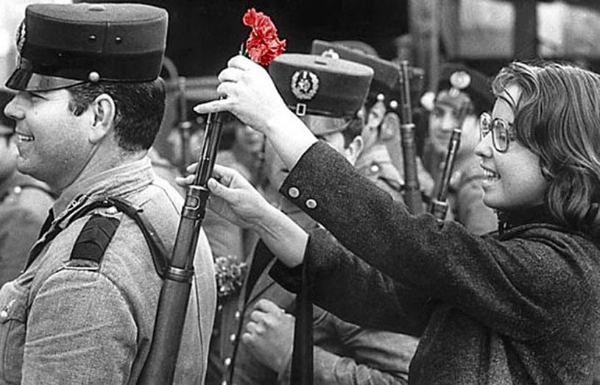50 Years: Portugal’s Carnation Revolution
TRANSCEND MEMBERS, 29 Apr 2024
René Wadlow – TRANSCEND Media Service
25 April 1974: what began as a military coup led by young officers who had participated in Portugal’s colonial wars became a revolution of the people. Red carnations were placed by people in the barrels of the insurgents’ guns – a symbol taken from earlier protests in the U.S.A. against the war in Vietnam. Thus the name “the Carnation Revolution” was given to the change in Portugal which ended the “Estado Novo” (The New State) a term used by the dictatorship of Antonio de Oliveira Salazar who came to power in 1933.
The Carnation Revolution not only reshaped the political landscape of Portugal but led to the independence of the Portuguese colonies of Africa:
Angola, Mozambique, Guinea-Bissau, Cape Verde and Sao Tomé et Principe. For over 15 years, finghting had gone on in Angola, Mozambique, and Guinea-Bissau which had destroyed the economy of these countries and which had disheartened the Portuguse military who saw no end to the colonial wars.
The Portuguese economy was also weak, and many young Portuguese left to work elsewhere especially France. Thus young military officers in Portugal started planning for a coup to change the government. By April 1974, they were ready. It was a bloodless coup, and in two days there was a new government which released political prisoners and who promised free speech and religious freedom.
However, civilian groups were not directly involved in the planning of the coup and were not prepared to build a democratic framework. Political instability followed, and there were several unsuccessful efforts at new coups.
Slowly a democratic culture developed. Civil institutions
and political parties created a peaceful society. April 1974 remains an important milestone on Europe’s democratic path.
______________________________________
 René Wadlow is a member of the TRANSCEND Network for Peace Development Environment. He is President of the Association of World Citizens, an international peace organization with consultative status with ECOSOC, the United Nations organ facilitating international cooperation and problem-solving in economic and social issues, and editor of Transnational Perspectives.
René Wadlow is a member of the TRANSCEND Network for Peace Development Environment. He is President of the Association of World Citizens, an international peace organization with consultative status with ECOSOC, the United Nations organ facilitating international cooperation and problem-solving in economic and social issues, and editor of Transnational Perspectives.
Tags: Democracy, European Union, Portugal, Red Carnation Revolution, Revolução dos Cravos, Salazar
This article originally appeared on Transcend Media Service (TMS) on 29 Apr 2024.
Anticopyright: Editorials and articles originated on TMS may be freely reprinted, disseminated, translated and used as background material, provided an acknowledgement and link to the source, TMS: 50 Years: Portugal’s Carnation Revolution, is included. Thank you.
If you enjoyed this article, please donate to TMS to join the growing list of TMS Supporters.

This work is licensed under a CC BY-NC 4.0 License.


Thanks for the refresher course, Renee Wadlow! And for all the good work you do!
I do recall that Portuguese Peaceful Revolution. The U.S. was still drowning in blood in its imperialist war in Vietnam.
I was an Instructor at a university, a young author, and I did voluntary work at a nearby prison in Florida.
Hope and despair intermingled in the world then… and in our world now.
Let’s keep putting flowers in gun barrels and and working for the best in us!